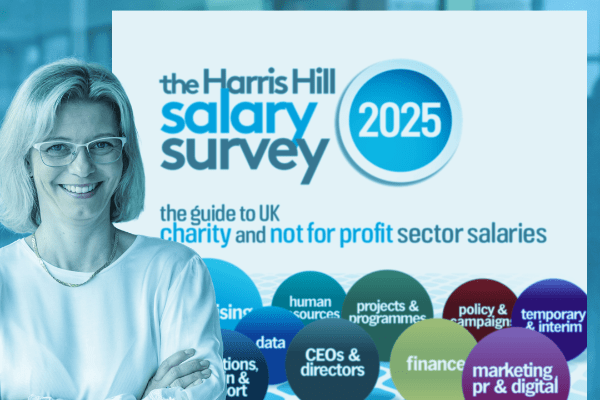
What makes a wonderful charity workplace, and how can you tell if it's right for you?
For the past year we've been teaming up with Third Sector to find out, highlighting examples of good practice and innovative ideas that have proven successful for a variety of organisations.
Earlier this month (recently published by Third Sector) our business services specialist Shweta Prabhakar spoke to Channing Rider, director of finance at The Winston Churchill Memorial Trust, about what he thinks makes a wonderful workplace and his top career tips for jobseekers.

• Tell us about the Winston Churchill Memorial Trust's mission and the work you do?
The Winston Churchill Memorial Trust runs the Churchill Fellowships, which are travel grants open to all UK citizens to research a topic of their choice anywhere in the world that can make a practical difference to their profession or community on their return. Applications for fellowships are open until 18 September 2018, and then again in May 2019. We were set up in 1965 as a living memorial for Sir Winston Churchill's leadership, and since then we have funded over 5,500 fellows to learn from the world.
I have a very posh title, director of finance and resources. As there is only one person in finance (me), it means that anything connected to financial, admin or governance matters eventually ends up on my desk.
• What does a wonderful workplace look like in your eyes and what are you doing at the Winston Churchill Memorial Trust to shape this?
A wonderful organisation has a passion for its mission, combined with a high concern for the team delivering it on every level. I am part of a management team which focuses on the mission and also ensures that everyone is valued and resourced to perform. The old story of the NASA caretaker, who, when asked what he did, always inspires me. He said: "I'm putting a man on the moon." Everyone matters.
• Employer branding and culture has been a hot topic for some time; when did you start thinking about it and why is it important?
Charities provide a vehicle for people from all walks of life to make a difference. It's a sector that needs to be valued, championed and put into the heart of society. If we fail to win public trust, engagement and confidence, then the consequences to some of the most vulnerable people in society are often very harsh; this is why charities must be subject to high levels of governance and scrutiny.
People engage with charities in different ways as employees, trustees, donors and supporters, so the culture must be one of scrupulous honesty and openness to win their commitment, and be backed up by inspirational leadership.

• How do you communicate your charity's working culture to current and future employees?
It's useful when people come for an interview to have an informal chat with staff before meeting the formal panel. Yes, it's a little artificial, but it sends a message to staff that their views matter. It also gives future employees the chance to fish around a little and gain a better impression of the working environment, as well as a sense of what type of people work here.
• What kind of people make a great fit in your charity?
People who are a great fit in the charity are customer focused, professional, flexible, friendly and unstuffy. We are a small charity, so apart from our formal roles and functions, we all have to cover for each other and muck in. For example, we all help with meetings during very busy periods, making coffee, clearing up. (Mind you, the communications manager did cut his thumb earlier this year to get out of doing the washing up!).
• How can third sector candidates identify if a charity's culture will suit them?
Organisational culture is so difficult to assess from the outside. I think the chief executive very much sets the tone. Find out what you can about the chief executive and members of the senior management team. Look for non-verbal clues during the interview. Do as much research as you can.
Sometimes, though, non-politically correct people can have a heart of gold, and vice versa. Try to square the circle of developing discernment without being judgemental. In the end it's best, in my opinion, to trust your instincts. It's also fine to take a risk. Working on a temp to perm contract is also a useful way of testing the water.

• How do you develop your staff?
The obvious things work best: one-to-ones, regular appraisals, feedback, training courses, in-house briefings, and just taking an interest in people.
Where people are in the career life cycle is also useful to be aware of. I'm 57 and have been working in the charity sector since I was 28 but, honestly, the rate of change is so quick I feel as if I am new to the game. Learning from each other is vital. Be generous with what you know and honest about what you don't. I learn so much from digital natives in their twenties, and I like to think they learn some things from me, but perhaps they are just being polite.
• What would be your advice to someone looking for their first charity job?
Charities need experienced, qualified professionals. But even if you've just started as an intern, as long as you have a hunger to learn and work hard, there should be a place for you.
Perhaps start with a smaller charity, as that will give you the opportunity to get involved in a wide range of issues and to make an impact. It is easier when starting out to get pigeonholed in a larger charity and feel remote from the mission. Mission Impossible becomes Mission Incomprehensible.
• And lastly, what are your top career tips for charity professionals?
I only have one tip. A little mental preparation that I do every day before starting work. I hope you find it useful. You may recognise the analogy adapted from St Paul:
I imagine a Roman soldier. I think of myself putting on the soldier's armour. First, there is the belt of truth upon which everything hangs. Be honest to yourself and others. Integrity is everything. Lose your credibility and all is lost.
Secondly, I put on strong boots or sandals so that I can be flexible, move fast, be in the right place.
Thirdly, I have a shield which I can be confident in because of my training and preparedness.
Fourthly, I have a helmet which stands for my intellect. You have a good mind. Use it. Think about what you are doing and why. How can the work be done in a better way? Learn constantly.
Finally, I put on a breastplate. It is important to put your heart into a role. We all have off-days when it gets very difficult to carry on, but caring about what you are doing makes it easier to deflect the arrows of misfortune when they come your way, as they surely will. Good luck!
Many thanks to Channing for sharing his insights and some very wise words for both employers and prospective candidates!
If you'd like to find out more about the Winston Churchill Memorial Trust, you canvisit their website here.
-

Opportunity for all
Find out how we’re working to deliver more diverse, equitable and inclusive recruitment…
-

Recruiting a charity CEO?
Our executive recruitment specialists have an exceptional record of successful CEO, chair, trustee and…
-

Charity sector salaries
Our 2025 Salary Survey has the latest rates and expert insight for roles throughout the sector.













